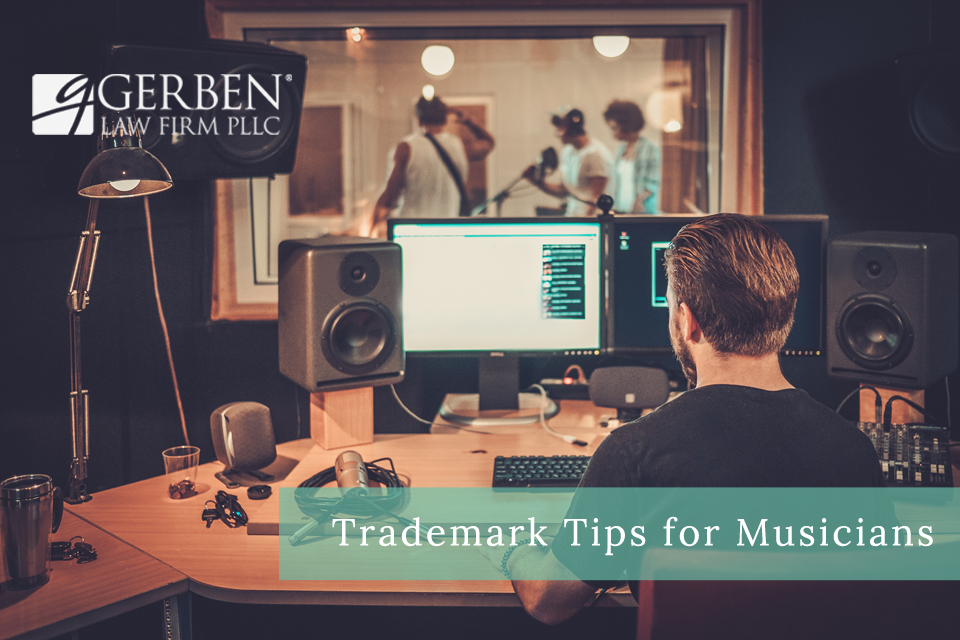Trademark Protection For a Band or Musician Name

Protecting the name of your band or musical acts name can help prevent confusion and can make marketing easier in the crowded music space. However, there are certain ways that musician trademarks differ from a typical trademark, especially in the requirements for registering a trademark for musical recordings with the United States Patent and Trademark Office (the USPTO.)
Should I Register My Band’s Name as a Trademark?
While trademark rights exist even if the trademark is not registered, registering the trademark takes your otherwise limited, local rights (unregistered trademark rights) and helps provide protection throughout the United States. In legal terms, it helps prove that you are, in fact, the owner of a trademark and that the trademark is protectable. From a business perspective, it is an asset that can be valuated, sold, and licensed to others. It also means that no other band can claim they “never heard of you” before selecting their own name, putting you in a solid legal position to ask them to stop using the similar band name that is likely to cause confusion with your name.
First, you must determine exactly what you plan to offer under the band/musical acts name.
Are You Selling (or Plan to Sell) Your Recorded Music?
Unless you are a DJ or a coverband, musical recordings will likely be the most important goods to protect on your application. However, the USPTO has a special requirement for musical recordings. In order to have “use” of a band name in connection with musical recordings, you must have released at least two releases (full-length or EP) and had sales of those releases where the name is prominently shown on the album art or album listing. If you don’t have this yet, you can reserve rights for up the three years (with additional fees involved) – more on that below.
Why is this a requirement? Under U.S. trademark law, the USPTO requires books, movies, and musical albums to be in a series in order to prevent every single book title, album name, or movie from preventing others from using something similar, just by publishing a single album. It also shows that the name is a trademark – i.e. a brand – and not just an aesthetic or eye-pleasing temporary name.
Are You Doing (or Plan to Do) Live Performances?
For many bands, live performances will be the day-to-day way that they are making money. For some musical artists, like DJs and cover bands, it is the core of their business. In order to register for live performances, you will need to have performed live under the band name. A flyer, website, or other advertisement will be good evidence that you’ve performed under the name. However, the performance can’t be a “one-off” performance just for the purposes of registering the trademark.
What About Merchandise? Should You Register for Pins, Hats, Shirts?
It depends. You must use the trademark as a brand for the merchandise you are offering. Pop stars will likely have their name in the neckline or on a tag indicated that these are “branded” products as opposed to just promotional products. Putting a band name on a t-shirt is not enough to establish trademark rights for t-shirts. The name would have to appear on a neck tag, hang tag, or, packaging for the clothing items. With stickers and pins, the name would need to appear as the brand of the stickers and pins not just on the front of them.
How Do I Reserve Rights While I Prepare To Release Music or Perform a Gig?
You can reserve rights in a trademark for up to three years through an “intent to use” application. By filing to reserve rights, no one can register a confusingly similar trademark while you prepare to release music and perform live. If someone uses a similar trademark during that time, once you begin use, you will be in a strong legal position to ask them to stop using the trademark.
However, you must have a bona fide intent to use the trademark, meaning that you cannot stockpile names with the vague thought that you may someday use it. You should be actively taking steps to use the trademark in order to show that you have an intent-to-use – recording sessions, discussions with bandmates, booking agents, etc. are all good ways to show a continued intent to use the trademark.
Use an Experienced Trademark Attorney
While the $99 trademark registration service may seem appealing, protecting your trademark involves dozens of legal decisions that should not be made lightly. You should contact an experienced trademark attorney to assist you in protecting and registering your musician name. Hiring an experienced trademark attorney is an investment in your brand that may help prevent you from being forced to change your name at your own expense, while putting thousands of dollars of merchandise and printed CDs in the trash while you rebrand.
Gerben IP offers a flat-rate trademark registration service and offers free consultations – contact our experienced attorneys today.
Do you need assistance with a trademark matter?
Contact an Attorney Today